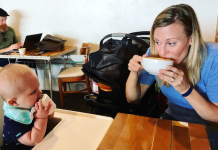 For parents of young children, the options for childcare are becoming increasingly harder to come by. Many preschools have drastically changed their programs, fees, and operating hours over the last few years, and there’s seemingly no end in sight. While I don’t know that I have the solution or answer to solving this problem, I do think it’s important that we talk about the problem. We can’t begin to fix what we don’t understand.
For parents of young children, the options for childcare are becoming increasingly harder to come by. Many preschools have drastically changed their programs, fees, and operating hours over the last few years, and there’s seemingly no end in sight. While I don’t know that I have the solution or answer to solving this problem, I do think it’s important that we talk about the problem. We can’t begin to fix what we don’t understand.
READ: Guide to Schools, Preschools, & Childcare in Jacksonville
Let’s start by looking at some of the changes providers are making that are having negative impacts on the availability and accessibility of childcare.
- Tuition Cost Increases: It’s probably no surprise to anyone who has been paying attention to the cost of living that yes, childcare costs have risen. As the cost of living and market prices rise, so does the cost of operating a childcare center. Between the rises in price for supplies, the need to increase teacher pay, and the cost of operating the facilities, it can certainly be argued that there have been justifiable reasons for price increases. However, some preschools have increased their prices so drastically over the course of 1–2 years (I’m talking doubling the cost from one school year to the next) that it has left families stranded in the wake of that whiplash.
- Changes to Hours Provided: As a way to cut costs, many preschools have started to cut the hours they’re open. Many schools have schedules that offer 8 or 9 a.m. start times and 3 p.m. end times, and most schools used to offer extended day hours from 7–9 a.m. and/or 3–5 or 6 p.m. But that is becoming less true every year with more preschools opting to only offer the core 9 a.m.–3 p.m. hours. Why? Because this reduces their overhead costs and need for staffing. Staffing, like in all education fields, is difficult for a lot of childcare providers. There is a massive need for early childhood educators to be paid adequately and be offered benefits, which is something that most centers cannot afford to provide, leading to high turnover rates. In addition to shortening the hours, many preschools are following a public-school type of schedule where they are closed for summer break, winter and spring breaks, and many other days (weather days, teacher planning days). When school-aged kids are on break, there are usually camps available to working parents who still need childcare during those times but that’s not the case for preschool-aged children.
- Schools Opting to Not Participate in the Statewide VPK Program: As you may already know, Florida has a statewide program through the Early Learning Coalition (ELC) that allows all children to participate in VPK for free. It’s managed through a voucher program where the fees are paid by the ELC directly to their participating providers at a fee-per-student rate. The voucher covers the “core hours” of the VPK program, which in Florida are Monday–Thursday, 9 a.m.–1 p.m. For families who need care on Fridays or outside of those four daily hours (which is most families), you have to find a provider who has extended care options and is responsible for the fees for the additional hours. In order to use the voucher at a preschool, they must be an approved ELC provider — and not all schools are approved, nor do all schools choose to participate. For me, this is where my recent problem began. Providers opting out of this program isn’t widespread but is becoming more common and it’s causing havoc. It’s unfair to families and it’s unsustainable for the childcare industry because the providers who are continuing to take the vouchers will fill up their spots and waiting lists for these schools will continue to grow.
Here’s how these changes are impacting families:
My daughter is 3 and will be in VPK next school year. Last week, we were informed (through a letter in my daughter’s backpack — not even through a conversation) that my daughter’s preschool would no longer be participating in the statewide VPK program. Because of that, the monthly cost for her to be in the 4-year-old class at this school five days a week, 7 a.m.–4 p.m., will be increasing from this year’s price of $590 for that class to $1,150! They are DOUBLING the cost for families with only three months of notice before they are closed for summer break. Of the 12 children in her current class, I only know of one who will be returning to the school next year as a result of these changes. This is devastating because most of these children have been together for their entire preschool journey (infant class through the 3-year-old class). Having to make a decision to break that continuity of care and social environment for our children right before their last year in preschool is awful. While I’ve thankfully found another preschool (that we love) where my daughter will be moving to next year that does take the VPK voucher, it doesn’t change the fact that this is an unacceptable rate of change to thrust upon families.
Whether it’s due to sky-rocketing prices, fewer schools offering extended hours in the morning or afternoon, schools choosing not to participate in the statewide VPK program, or a plethora of other factors, the reality is that parents everywhere are struggling to find quality childcare that is affordable and accessible. The immediate impact of this is felt primarily by families but the long-term impacts of this will be felt by everyone. Having access to quality early childhood education that is affordable is critical to helping parents remain (or rejoin) the workforce. It’s also crucial to ensuring our children are adequately prepared to go to kindergarten and ready to succeed in school.
Our children deserve better. Our teachers deserve better. Our community deserves better.
















